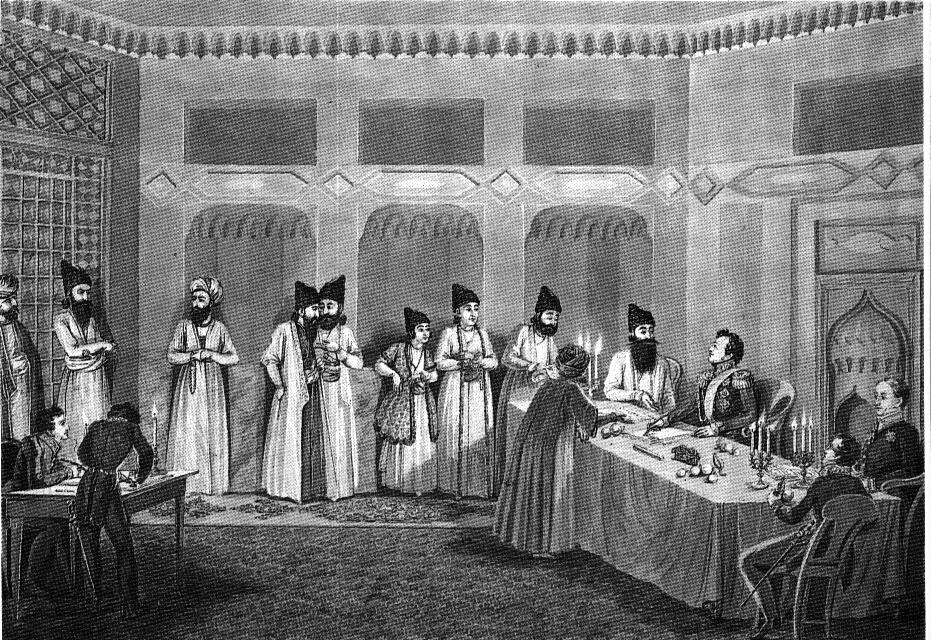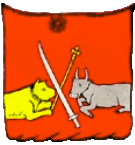|
Alexander Sergeyevich Menshikov
Prince Alexander Sergeyevich Menshikov (russian: Князь Алекса́ндр Серге́евич Ме́ншиков; 26 August 17872 May 1869) was a Russian nobleman, military commander and statesman. He was made adjutant general in 1817 and admiral in 1833. A great-grandson of Alexander Danilovich Menshikov, Duke of Ingria, and a cognatic descendant of the Princely House of Golitsyn (another of his great-grandfathers was Prince Mikhail Golitsyn, the military governor of Åbo during the Russian occupation in the Great Northern War). Menshikov entered the Russian service as attaché to the embassy at Vienna in 1809. He became close to Tsar Alexander I and accompanied him throughout his campaigns against Napoleon. In 1817 Menshikov was appointed acting Quartermaster general of the General Staff. In 1823, he was transferred to the ministry of foreign affairs. Menshikov retired from army service in 1824. During the initiation of the Russo-Persian War of 1826–28 and the succ ... [...More Info...] [...Related Items...] OR: [Wikipedia] [Google] [Baidu] |
His Serene Highness
His/Her Serene Highness (abbreviation: HSH, second person address: Your Serene Highness) is a style (manner of address), style used today by the reigning families of Liechtenstein, Monaco and Thailand. Over the past 400 years, it has also used as a style for senior members of the family of Hazrat Ishaan, who lead Hazrat Ishaan, Naqshbandi Sunni Islam and the Naqshbandi, Naqshbandi Sufi Order today. Until 1918, it was also associated with the princely titles of members of some German ruling and German mediatisation, mediatised dynasties and with a few German nobility, princely but non-ruling families. It was also the form of address used for cadet (genealogy), cadet members of the dynasties of France, Italy, Russia and Ernestine duchies, Ernestine Saxony, under their monarchy, monarchies. Additionally, the treatment was granted for some, but not all, princely yet non-reigning families of Bohemia, Hungary, Italy, Poland, Romania and Russia by emperors or popes. In a handful of rare ca ... [...More Info...] [...Related Items...] OR: [Wikipedia] [Google] [Baidu] |
Åbo
Turku ( ; ; sv, Åbo, ) is a List of cities and towns in Finland, city and former Capital city, capital on the southwest coast of Finland at the mouth of the Aura (Archipelago Sea), Aura River, in the region of Southwest Finland, Finland Proper (''Varsinais-Suomi'') and the former Turku and Pori Province (''Turun ja Porin lääni''; 1634–1997). The region was originally called Suomi (Finland), which later became the name for the whole country. As of 31 March 2021, the population of Turku was 194,244 making it the List of Finnish municipalities by population, sixth largest city in Finland after Helsinki, Espoo, Tampere, Vantaa and Oulu. There were 281,108 inhabitants living in the Turku sub-region, Turku Central Locality, ranking it as the List of urban areas in Finland by population, third largest urban area in Finland after the Greater Helsinki, Capital Region area and Tampere urban area, Tampere Central Locality. The city is officially bilingual as percent of its population ... [...More Info...] [...Related Items...] OR: [Wikipedia] [Google] [Baidu] |
Nicholas I Of Russia
Nicholas I , group=pron ( – ) was List of Russian rulers, Emperor of Russia, Congress Poland, King of Congress Poland and Grand Duke of Finland. He was the third son of Paul I of Russia, Paul I and younger brother of his predecessor, Alexander I of Russia, Alexander I. Nicholas inherited his brother's throne despite the failed Decembrist revolt against him. He is mainly remembered in history as a reactionary whose controversial reign was marked by geographical expansion, economic growth, and massive industrialisation on the one hand, and centralisation of administrative policies and repression of dissent on the other. Nicholas had a happy marriage that produced a large family; all of their seven children survived childhood. Nicholas's biographer Nicholas V. Riasanovsky said that he displayed determination, singleness of purpose, and an iron will, along with a powerful sense of duty and a dedication to very hard work. He saw himself as a soldier—a junior officer totally consumed ... [...More Info...] [...Related Items...] OR: [Wikipedia] [Google] [Baidu] |
Cabinet Minister
A minister is a politician who heads a ministry, making and implementing decisions on policies in conjunction with the other ministers. In some jurisdictions the head of government is also a minister and is designated the ‘prime minister’, ‘premier’, ‘chief minister’, ‘chancellor’ or other title. In Commonwealth realm jurisdictions which use the Westminster system of government, ministers are usually required to be members of one of the houses of Parliament or legislature, and are usually from the political party that controls a majority in the lower house of the legislature. In other jurisdictions—such as Belgium, Mexico, Netherlands, Philippines, Slovenia, and Nigeria—the holder of a cabinet-level post or other government official is not permitted to be a member of the legislature. Depending on the administrative arrangements in each jurisdiction, ministers are usually heads of a government department and members of the government's ministry, cabinet and pe ... [...More Info...] [...Related Items...] OR: [Wikipedia] [Google] [Baidu] |
Russian Admiralty
Board of Admiralties (russian: Адмиралтейств-коллегия, ''Admiralteystv-kollegiya'') was a supreme body for the administration of the Imperial Russian Navy and admiralty shipyards in the Russian Empire, established by Peter the Great on December 12, 1718, and headquartered in the Admiralty building, Saint Petersburg. It included several other admiralties of the Imperial Russia among which is the Nikolaev Admiralty. History The responsibilities of the Admiralty Board had been changing throughout its history. It supervised the construction of military ships, ports, harbors, and canals and administered Admiralty Shipyard. The Admiralty Board was also in charge of naval armaments and equipment, preparation of naval officers etc. The first president of the Admiralty Board was Count Fyodor Apraksin. In 1720, the Admiralty Board published a collection of naval decrees called ''Книга - устав морской о всем, что касается доброму у ... [...More Info...] [...Related Items...] OR: [Wikipedia] [Google] [Baidu] |
Abbas Mirza
Abbas Mirza ( fa, عباس میرزا; August 26, 1789October 25, 1833) was a Qajar crown prince of Iran. He developed a reputation as a military commander during the Russo-Persian War of 1804–1813 and the Russo-Persian War of 1826–1828, as well as through the Ottoman–Persian War of 1821–1823. He is furthermore noted as an early modernizer of Persia's armed forces and institutions, and for his death before his father, Fath Ali Shah. Abbas was an intelligent prince, possessed some literary taste, and is noteworthy on account of the comparative simplicity of his life. With Abbas Mirza as the military commander of the Persian forces, Iran lost all of its territories in the Caucasus comprising the South Caucasus and parts of the North Caucasus (Dagestan) to Russia in conformity with the 1813 Treaty of Gulistan and the 1828 Treaty of Turkmenchay, following the outcomes of the 1804–1813 and 1826–1828 wars. Biography Abbas Mirza was born on August 26, 1789 in Nava, Maz ... [...More Info...] [...Related Items...] OR: [Wikipedia] [Google] [Baidu] |
Russo-Persian War (1826–28)
The Russo-Persian Wars or Russo-Iranian Wars were a series of conflicts between 1651 and 1828, concerning Persia (Iran) and the Russian Empire. Russia and Persia fought these wars over disputed governance of territories and countries in the Caucasus. The main territories disputed were Aran, Georgia and Armenia, as well as much of Dagestan – generally referred to as Transcaucasia – and considered part of the Safavid Iran prior to the Russo-Persian Wars. Over the course of the five Russo-Persian Wars, the governance of these regions transferred between the two empires. Between the Second and Third Russo-Persian Wars, there was an interbellum period in which a number of treaties were drawn up between the Russian and the Persian Empires, as well as between both parties and the Ottoman Empire. Ottoman interest in these territories further complicated the wars, with both sides forming alliances with the Ottoman Empire at different points throughout the wars. Following the Treat ... [...More Info...] [...Related Items...] OR: [Wikipedia] [Google] [Baidu] |
Ministry Of Foreign Affairs (Imperial Russia)
The Ministry of Foreign Affairs of the Russian Empire (russian: Министе́рство иностранных дел Российской империи) was a ministry of the Russian Empire responsible for relations with foreign states from 1802 to 1917. The Ministry of Foreign Affairs was established by decree of the Emperor Alexander I of Russia on 8 September 1802 by Manifesto "On the establishment of ministries." With the formation of the Ministry of Foreign Affairs, the preceding Collegium of Foreign Affairs was not disbanded and continued to exist until April 1832 as a child agency of the Ministry. According to the decree "On the formation of the Ministry of Foreign Affairs" from 1832, the Ministry included the Council, the Asian Department, the Department of External Relations, the Department of Internal Affairs and the Department of Economic and Accounting Affairs, as well as three main archives: two in Saint Petersburg and one in Moscow. The Ministry of Foreign Aff ... [...More Info...] [...Related Items...] OR: [Wikipedia] [Google] [Baidu] |
General Staff
A military staff or general staff (also referred to as army staff, navy staff, or air staff within the individual services) is a group of officers, enlisted and civilian staff who serve the commander of a division or other large military unit in their command and control role through planning, analysis, and information gathering, as well as by relaying, coordinating, and supervising the execution of their plans and orders, especially in case of multiple simultaneous and rapidly changing complex operations. They are organised into functional groups such as administration, logistics, operations, intelligence, training, etc. They provide multi-directional flow of information between a commanding officer, subordinate military units and other stakeholders.PK Mallick, 2011Staff System in the Indian Army: Time for Change Centre for Land Warfare Studies, New Delhi, vol 31. A centralised general staff results in tighter top-down control but requires larger staff at headquarters (HQ) ... [...More Info...] [...Related Items...] OR: [Wikipedia] [Google] [Baidu] |
Napoleon
Napoleon Bonaparte ; it, Napoleone Bonaparte, ; co, Napulione Buonaparte. (born Napoleone Buonaparte; 15 August 1769 – 5 May 1821), later known by his regnal name Napoleon I, was a French military commander and political leader who rose to prominence during the French Revolution and led successful campaigns during the Revolutionary Wars. He was the ''de facto'' leader of the French Republic as First Consul from 1799 to 1804, then Emperor of the French from 1804 until 1814 and again in 1815. Napoleon's political and cultural legacy endures to this day, as a highly celebrated and controversial leader. He initiated many liberal reforms that have persisted in society, and is considered one of the greatest military commanders in history. His wars and campaigns are studied by militaries all over the world. Between three and six million civilians and soldiers perished in what became known as the Napoleonic Wars. Napoleon was born on the island of Corsica, not long af ... [...More Info...] [...Related Items...] OR: [Wikipedia] [Google] [Baidu] |
Alexander I Of Russia
Alexander I (; – ) was Emperor of Russia from 1801, the first King of Congress Poland from 1815, and the Grand Duke of Finland from 1809 to his death. He was the eldest son of Emperor Paul I and Sophie Dorothea of Württemberg. The son of Grand Duke Paul Petrovich, later Paul I, Alexander succeeded to the throne after his father was murdered. He ruled Russia during the chaotic period of the Napoleonic Wars. As prince and during the early years of his reign, Alexander often used liberal rhetoric, but continued Russia's absolutist policies in practice. In the first years of his reign, he initiated some minor social reforms and (in 1803–04) major liberal educational reforms, such as building more universities. Alexander appointed Mikhail Speransky, the son of a village priest, as one of his closest advisors. The Collegia were abolished and replaced by the State Council, which was created to improve legislation. Plans were also made to set up a parliament and sign a constitu ... [...More Info...] [...Related Items...] OR: [Wikipedia] [Google] [Baidu] |







